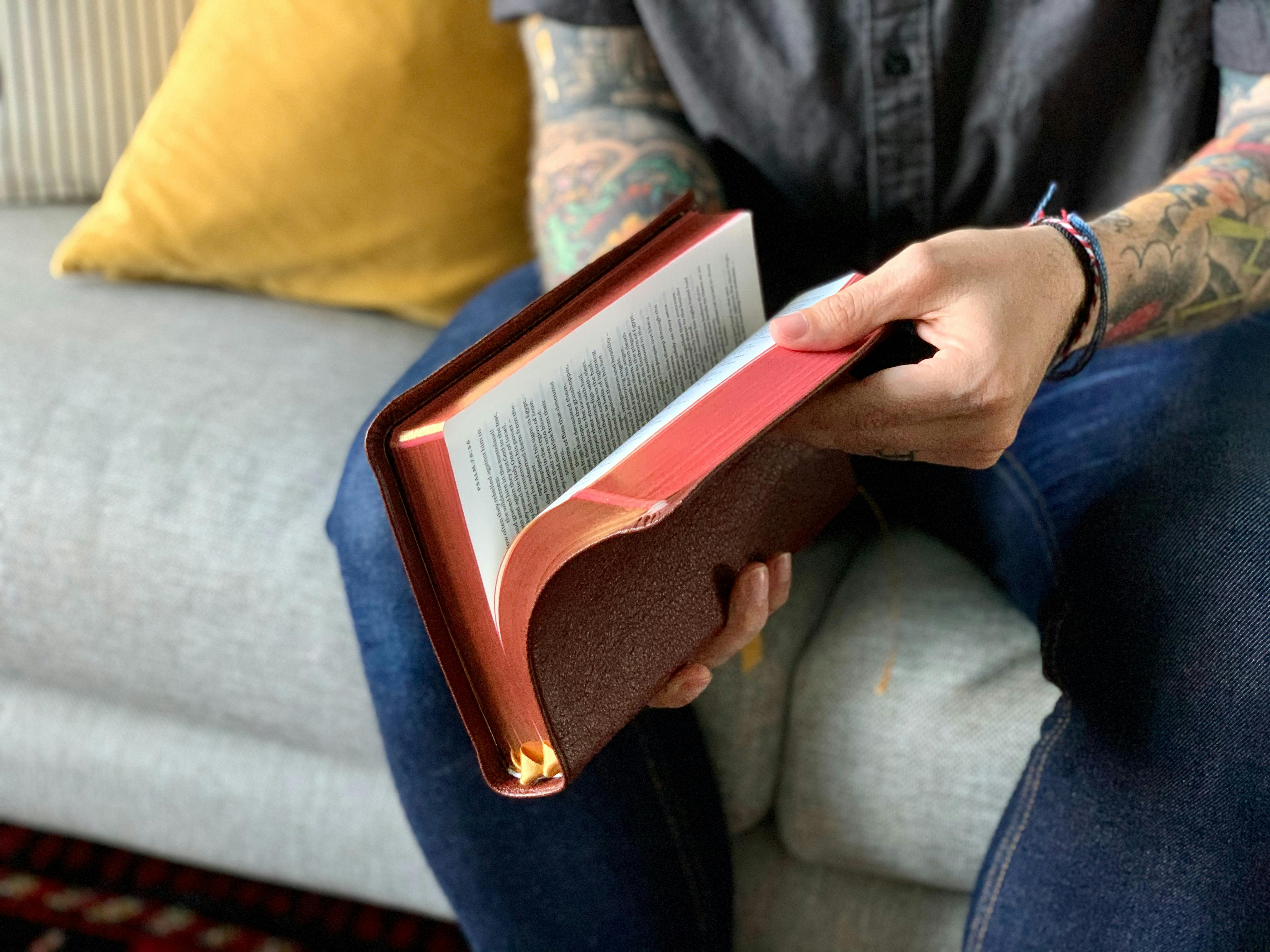Are Tattoos In The Bible? Yes, the Bible addresses tattoos, but interpreting its message requires understanding the historical and cultural context, which we will explore here at tattooat.com. By examining relevant scriptures and considering different viewpoints, you can make an informed decision about whether getting inked aligns with your faith and personal beliefs. We will also cover the history of tattoos, tattoo meanings and biblical principles to help guide you in your journey.
1. Unpacking the Scripture: What Does the Bible Actually Say About Tattoos?
What does the Bible say about tattoos? The Old Testament contains the most direct reference to tattoos, specifically in Leviticus 19:28, which states, “You shall not make any cuts on your body for the dead or tattoo yourselves: I am the Lord.” However, this verse needs to be understood within its historical and cultural context.
1.1 Contextualizing Leviticus 19:28: A Deeper Dive
What is the historical context of Leviticus 19:28? Leviticus was written for the ancient Israelites and contained laws intended to set them apart from the surrounding pagan cultures. Many of these cultures practiced ritualistic self-mutilation and tattooing as a way to mourn the dead or honor their gods. These practices were often associated with superstitious beliefs and idolatry.
According to research from Portland State University’s Art Department, in July 2023, ancient cultures often used tattoos to mark individuals for religious or social status, practices that were in direct conflict with the monotheistic faith of the Israelites.
1.2 Interpreting the Intent: Why Was Tattooing Prohibited?
What was the intention behind the prohibition of tattoos in Leviticus 19:28? Many scholars believe that the prohibition was intended to prevent the Israelites from adopting the pagan practices of their neighbors, emphasizing their unique identity as God’s chosen people. The verse is not necessarily a blanket condemnation of all forms of body art, but rather a specific prohibition against practices associated with false religions and the worship of the dead.
1.3 The New Testament Perspective: Does It Offer Further Guidance?
Does the New Testament offer further guidance on the topic of tattoos? The New Testament does not explicitly mention tattoos. Some Christians believe that the Old Testament laws, including the prohibition against tattoos, are no longer binding on believers due to Jesus’s fulfillment of the law. Others argue that the underlying principles of these laws, such as avoiding pagan practices and honoring God with one’s body, still apply.
According to Inked Magazine, many modern Christians look to the New Testament for guidance on tattoos, focusing on principles of love, grace, and personal conviction rather than strict adherence to Old Testament laws.
2. Exploring Different Christian Views on Tattoos: A Spectrum of Beliefs
Are there different Christian views on tattoos? Yes, Christians hold a wide range of views on tattoos. Some believe that tattoos are always wrong, citing Leviticus 19:28 as a clear prohibition. Others believe that tattoos are permissible as long as they are not associated with paganism or idolatry, and as long as they glorify God. Still others believe that the decision to get a tattoo is a matter of personal conviction and freedom.
2.1 The Conservative View: A Strict Interpretation
What is the conservative Christian view on tattoos? Those holding a conservative view often interpret Leviticus 19:28 as a direct and timeless prohibition against tattoos. They may also argue that tattoos are a form of body modification that defiles the temple of the Holy Spirit (1 Corinthians 6:19-20).
2.2 The Moderate View: Context and Intent Matter
What is the moderate Christian view on tattoos? Those holding a moderate view take into account the historical and cultural context of Leviticus 19:28. They may believe that tattoos are permissible as long as they are not associated with paganism or idolatry, and as long as they are done for the right reasons, such as to express faith or honor God.
2.3 The Liberal View: Personal Freedom and Expression
What is the liberal Christian view on tattoos? Those holding a more liberal view emphasize personal freedom and the individual’s right to make decisions about their own body. They may believe that tattoos are a form of self-expression that can be used to communicate one’s identity, beliefs, or values.
3. Key Considerations Before Getting Inked: A Christian’s Guide
What are key considerations for Christians before getting a tattoo? For Christians considering getting a tattoo, it is essential to carefully consider their motives, the message they want to convey, and how their decision might impact others. Prayerful reflection and seeking counsel from trusted spiritual leaders can help guide this decision-making process.
3.1 Motives: Why Do You Want a Tattoo?
What are some appropriate and inappropriate motives for getting a tattoo? It is important to examine your motives for wanting a tattoo. Are you seeking to express your faith, honor God, or commemorate a meaningful event? Or are you seeking to rebel, draw attention to yourself, or conform to societal pressures?
3.2 Message: What Will Your Tattoo Communicate?
What kind of message should a Christian tattoo communicate? Consider the message that your tattoo will communicate to others. Will it be a positive and uplifting message that reflects your faith and values? Or will it be a message that is offensive, controversial, or sexually suggestive?
3.3 Impact: How Will Your Tattoo Affect Others?
How will your tattoo affect others, particularly those within your Christian community? Consider how your decision might impact others, especially those within your Christian community. Will it cause them to stumble or question their own beliefs? Will it be a source of division or unity?
4. Tattoos as a Form of Expression: Exploring the Potential for Good
Can tattoos be used as a form of expression? Yes, tattoos can be a powerful form of expression. For Christians, tattoos can be used to express their faith, share their testimony, or commemorate a meaningful spiritual experience. However, it is important to ensure that the tattoo is done in a way that is tasteful, respectful, and glorifying to God.
4.1 Expressing Faith: Sharing Your Beliefs Through Ink
How can tattoos be used to express faith? Many Christians choose to get tattoos that depict Bible verses, Christian symbols, or images that represent their faith. These tattoos can serve as a constant reminder of God’s love and grace, as well as a conversation starter for sharing their faith with others.
4.2 Sharing Your Testimony: Telling Your Story Through Body Art
How can tattoos be used to share a personal testimony? Tattoos can also be used to share a personal testimony of God’s work in one’s life. For example, someone who has overcome addiction might get a tattoo that symbolizes their journey to recovery and their reliance on God’s strength.
4.3 Commemorating Spiritual Experiences: Marking Meaningful Moments
How can tattoos be used to commemorate spiritual experiences? Tattoos can be used to commemorate meaningful spiritual experiences, such as a baptism, a mission trip, or a life-changing encounter with God. These tattoos can serve as a reminder of these special moments and the impact they have had on one’s life.
 Christian Tattoos
Christian Tattoos
5. Navigating Regret: What If You Already Have a Tattoo?
What if you already have a tattoo that you regret? If you already have a tattoo that you regret, it is important to remember that God’s grace is sufficient. Confess your regret to God and ask for forgiveness. You can also explore options for tattoo removal or cover-up, if desired.
5.1 Seeking Forgiveness: God’s Grace Is Sufficient
How can you seek forgiveness for a tattoo you regret? If you regret getting a tattoo, the first step is to seek forgiveness from God. Confess your regret and ask for His grace and mercy. Remember that God’s love is unconditional and that He is always willing to forgive those who come to Him with a humble and contrite heart.
5.2 Exploring Options: Removal or Cover-Up
What are the options for dealing with a tattoo you regret? If you desire, you can also explore options for tattoo removal or cover-up. Tattoo removal can be expensive and time-consuming, but it is an option for those who want to completely eliminate the tattoo. Cover-up tattoos involve getting a new tattoo that covers the old one. This can be a good option for those who want to transform a tattoo they regret into something meaningful and beautiful.
5.3 Focusing on the Future: Living a Life That Honors God
How can you focus on living a life that honors God, regardless of past tattoos? Ultimately, the most important thing is to focus on living a life that honors God. This means striving to live according to His Word, loving others, and using your gifts and talents to serve Him. Your past mistakes do not define you, and God can use even your regrets for His glory.
6. Finding Inspiration and Guidance at Tattooat.com: Your Tattoo Journey Starts Here
Looking for inspiration for your next tattoo? At tattooat.com, we offer a vast library of tattoo designs, from intricate religious symbols to modern artistic expressions. Our curated list of talented tattoo artists and reputable studios across the USA ensures you’ll find the perfect match for your vision and values.
6.1 Browse a Diverse Collection of Tattoo Designs
Discover a wide array of tattoo designs that align with your Christian faith and personal style. From classic crosses and Bible verses to modern interpretations of spiritual themes, tattooat.com has something for everyone.
6.2 Connect with Talented Tattoo Artists
Find skilled tattoo artists who understand the importance of expressing your faith through body art. Our directory features artists with experience in creating meaningful and respectful Christian-themed tattoos.
6.3 Read Informative Articles and Guides
Gain valuable insights into the world of tattoos, including tips on aftercare, pain management, and choosing the right design. Our articles provide a comprehensive resource for anyone considering getting inked.
 Bible Verse Tattoos
Bible Verse Tattoos
7. The Art of Tattooing: Styles and Techniques
What are some popular tattoo styles? The world of tattooing is vast and varied, with numerous styles and techniques to choose from. Understanding these different styles can help you find the perfect aesthetic for your tattoo. Here are some popular tattoo styles:
7.1 Realism
What is realism in tattooing? Realism tattoos aim to replicate images as accurately as possible, often resembling photographs. This style requires a high level of skill and attention to detail.
7.2 Traditional
What is traditional tattooing? Traditional tattoos, also known as old-school tattoos, are characterized by bold outlines, simple designs, and a limited color palette. Common motifs include anchors, roses, and eagles.
7.3 Watercolor
What is watercolor tattooing? Watercolor tattoos mimic the look of watercolor paintings, with soft, blended colors and a fluid, ethereal appearance.
7.4 Geometric
What is geometric tattooing? Geometric tattoos feature precise lines, shapes, and patterns, often creating intricate and symmetrical designs.
7.5 Blackwork
What is blackwork tattooing? Blackwork tattoos primarily use black ink to create bold, graphic designs. This style can range from simple shapes to complex patterns and illustrations.
8. Caring for Your Tattoo: Ensuring Longevity and Vibrancy
How do you care for a new tattoo? Proper aftercare is essential for ensuring that your tattoo heals properly and remains vibrant for years to come. Here are some tips for caring for your new tattoo:
8.1 Keep It Clean
How do you keep a new tattoo clean? Gently wash your tattoo with mild, fragrance-free soap and water two to three times a day. Avoid using harsh scrubs or abrasive cleansers.
8.2 Moisturize Regularly
How often should you moisturize a new tattoo? Apply a thin layer of fragrance-free moisturizer to your tattoo several times a day to keep it hydrated and prevent it from drying out.
8.3 Avoid Sun Exposure
Why should you avoid sun exposure with a new tattoo? Protect your tattoo from direct sunlight by wearing loose-fitting clothing or applying a broad-spectrum sunscreen with an SPF of 30 or higher.
8.4 Don’t Pick or Scratch
Why shouldn’t you pick or scratch a new tattoo? Avoid picking or scratching your tattoo, as this can damage the skin and increase the risk of infection.
8.5 Follow Your Artist’s Instructions
Why is it important to follow your tattoo artist’s instructions? Follow your tattoo artist’s specific aftercare instructions, as they may vary depending on the style and location of your tattoo.
9. The History of Tattoos: A Global Perspective
What is the history of tattoos? Tattoos have been practiced for thousands of years in cultures around the world. From ancient tribal markings to modern artistic expressions, tattoos have served a variety of purposes, including:
9.1 Cultural Identity
How have tattoos been used for cultural identity? In many cultures, tattoos have been used to signify tribal affiliation, social status, or religious beliefs.
9.2 Rite of Passage
How have tattoos been used as a rite of passage? Tattoos have often been used to mark significant life events, such as puberty, marriage, or warrior status.
9.3 Spiritual Significance
How have tattoos been used for spiritual significance? Tattoos have been used to connect individuals to the spiritual realm, offering protection, healing, or divine favor.
9.4 Adornment
How have tattoos been used for adornment? Tattoos have been used simply as a form of personal adornment, enhancing one’s beauty or expressing one’s individuality.
10. Tattoos in Modern Society: Trends and Acceptance
How are tattoos viewed in modern society? In modern society, tattoos have become increasingly mainstream and accepted. Once associated with rebellious subcultures, tattoos are now embraced by people from all walks of life.
10.1 Growing Acceptance
How has the acceptance of tattoos grown over time? The growing acceptance of tattoos can be attributed to several factors, including:
- Increased media visibility
- Celebrity endorsements
- The rise of tattoo artistry as a respected art form
- A greater emphasis on personal expression and individuality
10.2 Tattoo Trends
What are some current tattoo trends? Current tattoo trends include:
| Trend | Description |
|---|---|
| Minimalism | Simple, understated designs with clean lines and minimal shading |
| Botanical | Tattoos featuring flowers, leaves, and other plant-inspired motifs |
| Geometric | Intricate patterns and shapes that create visually striking designs |
| Fine Line | Delicate, detailed tattoos created with very thin needles |
| Abstract | Non-representational designs that focus on color, shape, and texture |
10.3 Tattoo Culture
What is tattoo culture like today? Tattoo culture is a vibrant and diverse community that celebrates the art of tattooing. Tattoo conventions, magazines, and online forums provide platforms for artists and enthusiasts to connect, share their work, and learn from one another.
Conclusion:
Are tattoos in the Bible? While the Bible does contain a verse that prohibits tattoos, its interpretation is complex and depends on historical context and personal conviction. For Christians considering tattoos, prayerful reflection, understanding motives, and seeking guidance from trusted sources are crucial. Tattooat.com offers a wealth of resources to help you explore designs, connect with artists, and make informed decisions. Visit tattooat.com today to begin your tattoo journey with confidence and clarity.
Ready to explore the world of Christian-inspired tattoos? Discover stunning designs, connect with talented artists, and gain valuable knowledge at tattooat.com. Your perfect tattoo is waiting!
Address: 1825 SW Broadway, Portland, OR 97201, United States
Phone: +1 (503) 725-3000
Website: tattooat.com
FAQ: Answering Your Questions About Tattoos and the Bible
1. Is getting a tattoo a sin according to the Bible?
The Bible mentions tattoos in Leviticus 19:28, which says, “You shall not make any cuttings in your flesh for the dead, nor tattoo any marks on you.” Some interpret this as a direct prohibition against tattoos, while others believe it was specific to the cultural practices of that time.
2. Does the New Testament say anything about tattoos?
The New Testament does not explicitly mention tattoos, so many Christians look to principles of love, grace, and personal conviction rather than strict adherence to Old Testament laws.
3. Can a Christian get a tattoo?
Whether a Christian can get a tattoo is a matter of personal conviction. Some believe it’s permissible if done to glorify God, while others believe it’s always wrong.
4. What should a Christian consider before getting a tattoo?
A Christian should consider their motives, the message the tattoo conveys, and how it might impact others. Prayerful reflection and seeking spiritual counsel are also important.
5. Is it okay to get a tattoo of a Bible verse?
Some Christians choose to get tattoos of Bible verses as a way to express their faith and keep God’s word close to them.
6. What if I regret getting a tattoo?
If you regret getting a tattoo, seek forgiveness from God and consider options like tattoo removal or cover-up. Focus on living a life that honors God, regardless of past tattoos.
7. How can tattoos be used as a form of expression for Christians?
Tattoos can be used to express faith, share testimonies, or commemorate meaningful spiritual experiences, as long as they are tasteful and glorifying to God.
8. What are some popular tattoo styles for Christians?
Popular tattoo styles for Christians include realism, traditional, watercolor, geometric, and blackwork, depending on personal preference and the message they want to convey.
9. How do I care for a new tattoo?
To care for a new tattoo, keep it clean, moisturize regularly, avoid sun exposure, don’t pick or scratch it, and follow your artist’s instructions.
10. Where can I find inspiration for Christian-themed tattoos?
You can find inspiration and guidance at tattooat.com, which offers a diverse collection of tattoo designs, talented artists, and informative articles and guides.
